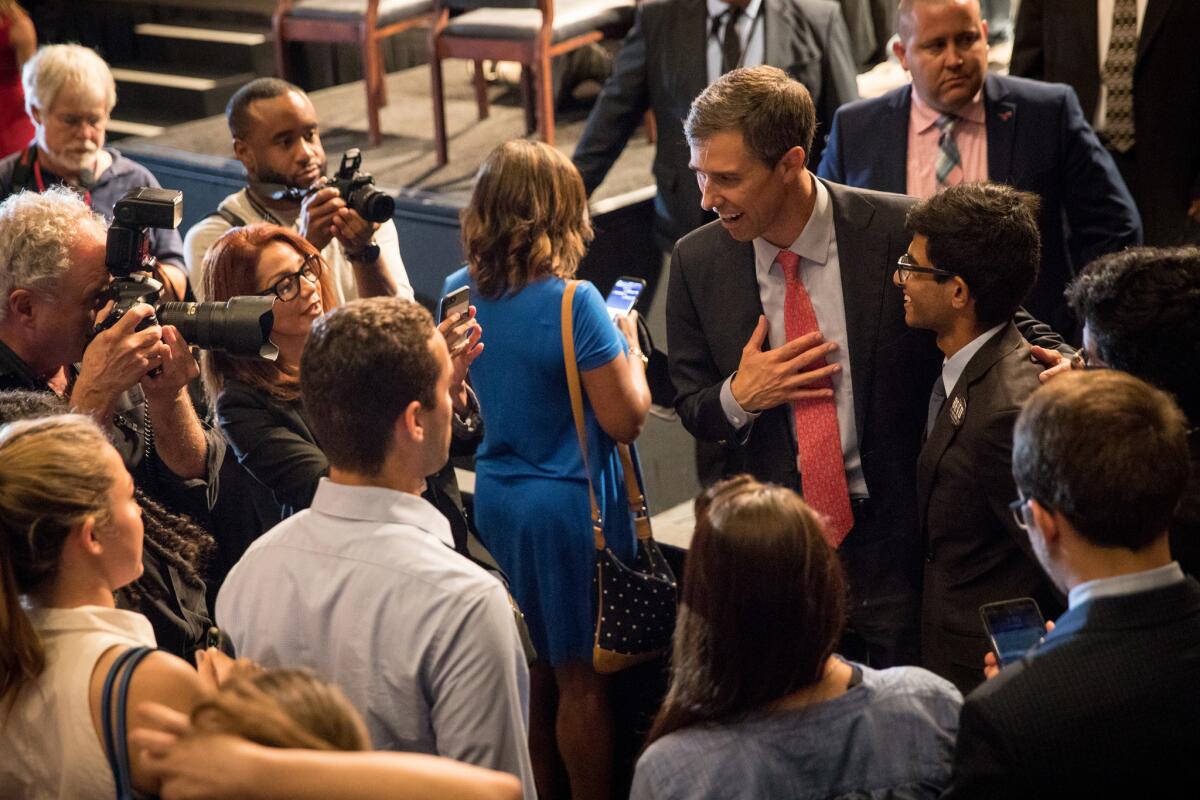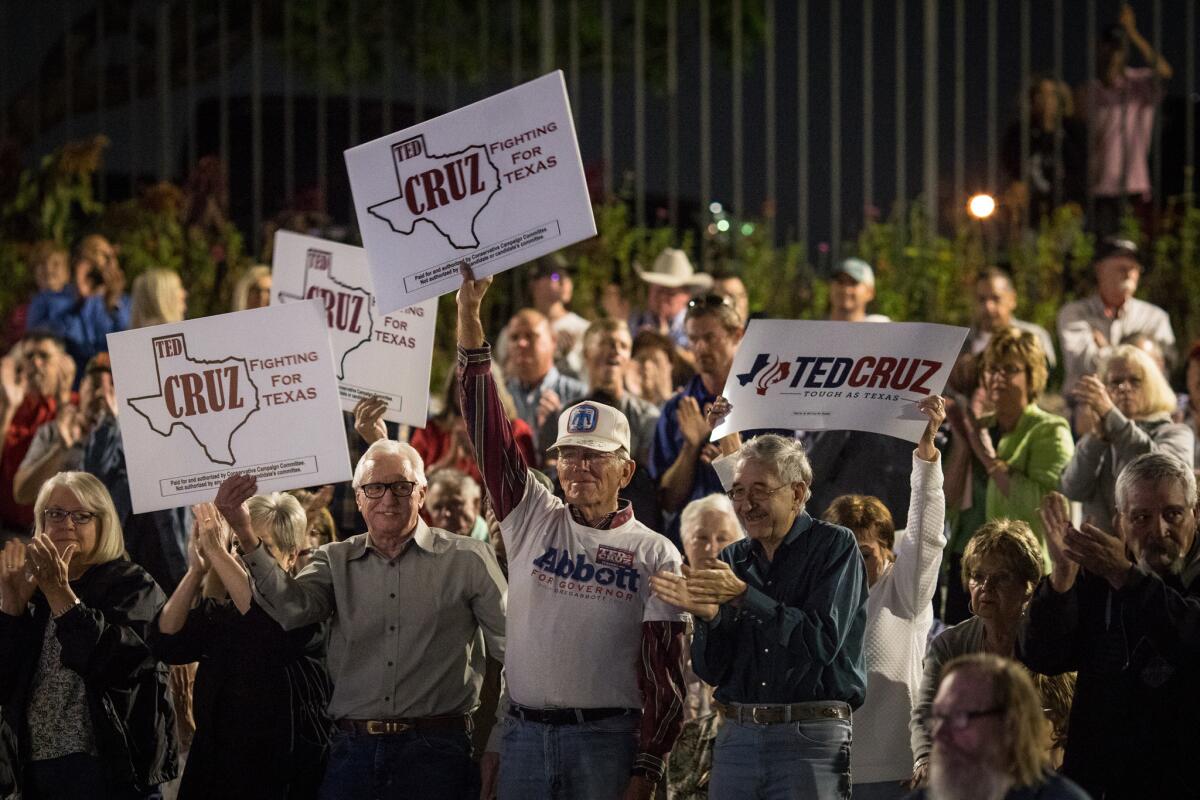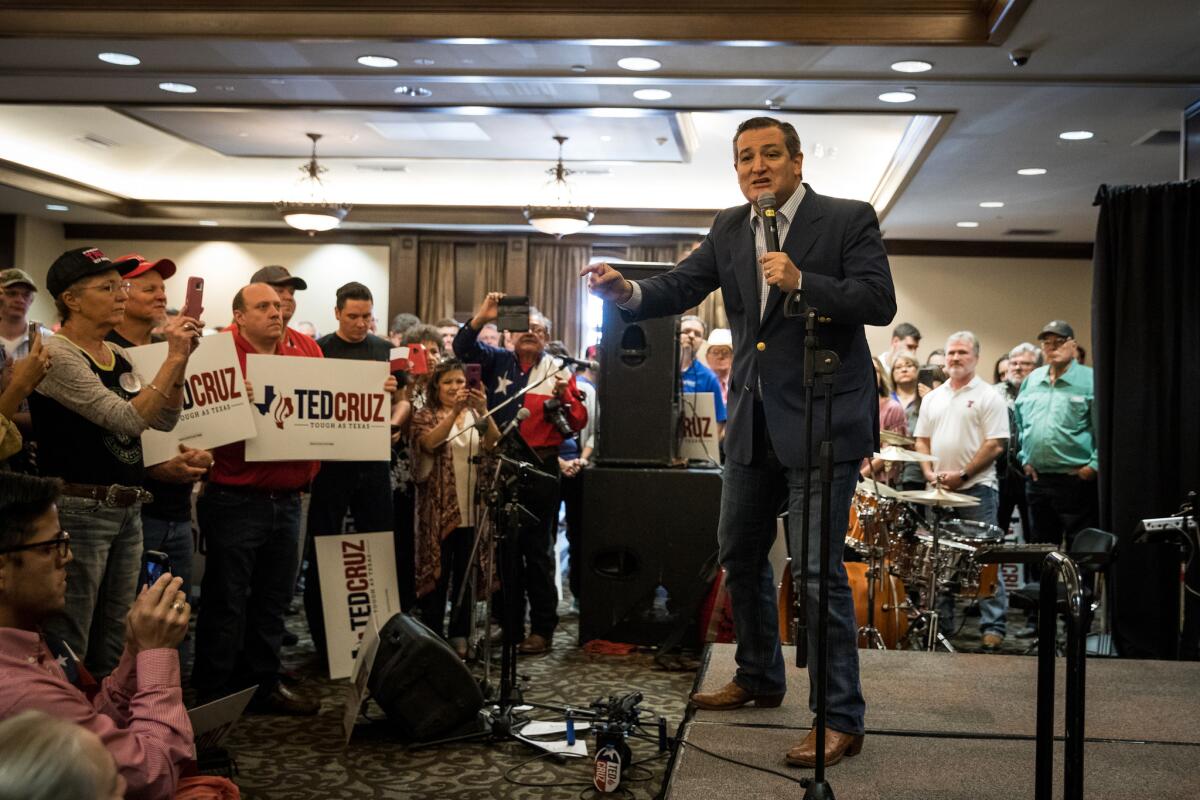Can Beto O’Rourke awaken Texas’ Latino vote? His bid to turn the state purple depends on it

Reporting from Amarillo, Texas — Ted Cruz is full of grievance over the precarious state of his Senate seat, and at a recent raucous rally here in the arid Texas Panhandle, he returned to a persistent one: the media’s tendency to describe his charismatic rival as a modern-day John F. Kennedy.
“Their favorite adjective of Beto is ‘Kennedyesque,’ usually with his hair blowing in the wind,” Cruz told an audience of hundreds gathered at a botanical garden, where the serenity of the setting couldn’t temper the crowd’s loathing for Democratic phenom Rep. Beto O’Rourke.
As Cruz warned that Texans would be taken over by freedom-hating socialists and have their guns confiscated if O’Rourke were to replace him, loyalists broke into angry chants against liberal villains including Hillary Clinton, George Soros and Black Lives Matter. Cruz, for his part, laid much of the blame for his political troubles on “Hollywood liberals.”
But, Cruz said, he had good news: “This is Texas, and there are a whole lot more conservatives than there are liberals in the state of Texas.”

Cruz has a point. John F. Kennedy didn’t win by much here in 1960, even with a Texan as a running mate, and the state has grown much more hostile to Democrats since. A full 170 statewide races have been run since the last time a Democrat won one here — even one who reporters deem to be “Kennedyesque.”
O’Rourke’s chances of living up to his pre-election hype and breaking his party’s losing streak depend heavily on something no recent Democrat has been able to manage: inspire a majority of the state’s surging Latino population to show up and vote.
He is literally a former punk rocker, and he can draw 1.5 million social media views just by skateboarding across a Whataburger parking lot. The Kennedyesque oratory that so irritates Cruz is drawing capacity crowds of potential new voters to events at every corner of the state.
That oratory is in both English and Spanish. O’Rourke, an Irish American who got the nickname Beto growing up in El Paso, easily transitions between the two languages before his heavily Latino crowds. The Cuban American Cruz, on the other hand, struggles with his Spanish and long ago abandoned his given first name of Rafael for the shortened version of his more Anglo middle name, Edward.
Without accepting a dollar of PAC or corporate money, O’Rourke is eclipsing Cruz in fundraising, accumulating amounts more typical of a top-tier presidential nominee, and he has drawn close in some recent polls.
The left is murmuring that maybe the White House is next for this candidate whose criminal record (burglary and DUI) and 1990s affinity for androgynous punk attire — traits once disqualifying in Texas — only seem to endear him to throngs of voters.
First, however, O’Rourke must solve a puzzle that is vexing even this campaign, which is the most buzzed-about thing Democrats have had since Obama or Bernie.
“We don’t know whether or not these big rallies will result in a swell in turnout,” said Matt Barreto, co-founder of Latino Decisions, a polling and research firm that works for several liberal groups and which has been steadily surveying Latinos in Texas for years.
A big concern is that the most recent data show Latinos reporting the same level of campaign outreach — someone actually knocking on the door and talking about the race — as was reported at this time in 2014. Those contacts, Barreto said, are the single most important thing a campaign can do to drive up turnout.

More than 2.1 million eligible Latinos in Texas didn’t vote in 2016. As college-educated, white suburban voters in places like Houston and Dallas migrate toward the Democrats in unexpected numbers, rattling the state’s electoral map, Democrats sense new opportunities they haven’t had before. Turning those into actual victories for statewide candidates, however, depends on turning out more of those non-voting Latino citizens.
“There is this huge potential if you get them registered and excited and starting to turn out that you can just swing the entire state,” Barreto said. “You could potentially just jump over the purple stage and turn Texas blue.”
That sort of dramatic shift happened in California in the 1990s. In Texas, however, it has been an elusive vision for Democrats. Many Republicans in the state remain extremely popular, including Gov. Greg Abbott, an unflinching conservative who is on target to trounce a Latina opponent, thanks in no small part to deep support from Latinos.
“Republicans are doing a better job in talking to Latinos in a way that is culturally competent,” said Cristina Tzintzún, executive director of Jolt, a Texas nonprofit focused on mobilizing and registering Latino voters.
“Republicans talk about the issues that matter to families,” she said. “Latinos want to hear their future will be better, not worse.”
The difficulty Democrats face here was underscored by the many Latinos present at Cruz rallies over the weekend.
Among them was a teacher named Robert who mocked O’Rourke for going with the nickname Beto. Another was Francisco Gutierrez, a 69-year-old Vietnam veteran from Lubbock, who was all in on Cruz’s caricature of the Democrat.
“I fought socialism, and I know what it does to people,” he said. “I don’t feel guilty at all. I am a grandfather and I want to protect my grandchildren from any ideas that don’t reflect who we are as a family. It is offensive for some people to want to force those values upon us.”

Eight hundred miles to the south, in the overwhelmingly Latino Rio Grande Valley, O’Rourke was energizing a different group of voters. Many are first- and second-generation immigrants, and they skew young. Their turnout rates in recent elections have been abysmal. Yet they are showing up at his rallies.
O’Rourke held his sixth event recently in Brownsville, a city many past Senate candidates would barely drive through. At rallies there and in nearby Edinburg, he drew emotional cheers as he railed against the GOP portrayal of the region as lawless and violent.
“This is a driver for the entire United States economy,” O’Rourke sermonized to a crowd packed into the banquet hall at the Social Club in Edinburg. “All of us at this moment are every bit as American as the person next to you, everyone just as important, just as deserving of being heard, listened to and fought for.”
He followed a tribute to the “Dreamers” with a lengthy condemnation of the separation and detention of families seeking asylum, which he said “no one would believe it if they hadn’t seen it happen with our own eyes.”
“We keep coming back because this is an incredibly important part of our country,” O’Rourke said before the rally. “The valley is everything that is right with this country.”
At the back of the Social Club, Latino millennials crowded around a voter registration table.
“I’ve never voted in my life,” said Joel Gutierrez, 20, who had just filled out a registration form. “My friends said you should go check him out,” he added, referring to O’Rourke. “Today was an awesome speech. When he was talking about politicians not coming over here to understand us, that really spoke to me.”
If O’Rourke is trying to shake up the Texas electoral map, Cruz is doing everything he can to keep it as is. He has had to swallow hard to energize a deeply conservative base that adores President Trump, the man who accused Cruz’s father of being involved in JFK’s assassination and mocked his wife’s looks to millions of Twitter followers.
Asked how he can cozy up to a politician he called a “sniveling coward” and “utterly immoral,” Cruz demurs.
“There were a lot of tough things said back and forth,” he said, “but the day he was elected, the world changed, and we have a job to do.”
“Working hand in hand with President Trump, we have delivered incredible victories,” he said during a brief interview in the parking lot after his Lubbock rally.
A few steps away, a vendor sold buttons stamped with the silhouette of a family on the run and the words, “Today’s Illegals, Tomorrow’s Democrats.”
“The hard left, the extreme left, they are angry, they are energized and many of them hate President Trump,” Cruz said. “That energy, that anger, is potent. It is dangerous. It is resulting in tens of millions of dollars flooding into this state.”
But, Cruz says, he remains confident it is all misplaced. “We see this every two, four years where the national media gets all excited Texas is going to turn blue,” he said. “And then it doesn’t happen.”
The latest look at the Trump administration and the rest of Washington »
[email protected] | Twitter: @evanhalper
More to Read
Get the L.A. Times Politics newsletter
Deeply reported insights into legislation, politics and policy from Sacramento, Washington and beyond. In your inbox three times per week.
You may occasionally receive promotional content from the Los Angeles Times.











